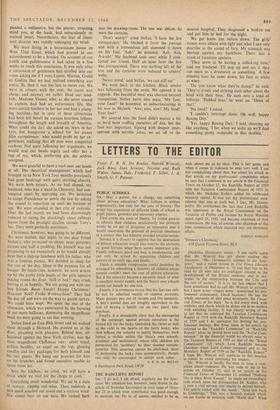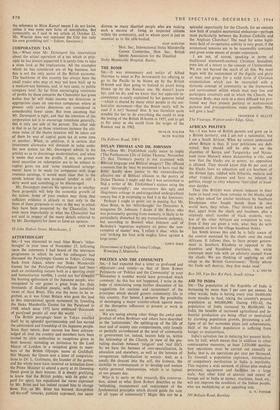THE RADCLIFFE REPORT
SIR,--I do not, I am afraid, regularly see the Spec- tator. My attention has, however, been drawn to the article of Nicholas Davenport in your issue of Octo- ber 23 in which your contributor was good enough to mention me. He is, of course, entitled to be as
rude about me as he likes. This is fair game and when it comes to rudeness he does very well. I am not complaining about that, but about his attack in that article on my professional competence when he says that I confused in my article in the Financial Times on October 13, the Radcliffe Report of 1959 with the Taxation Commission Report of 1955 to which Mr. Nicholas Kaldor added his celebrated minority report. It was not my professional com- petence that was at fault but, I fear, Mr. Daven- port's. He overlooked the fact that Lord Radcliffe was appointed to the Royal Commission on the Taxation of Profits and Income by Royal Warrant dated April 28, 1952, and became chairman of that commission. He was, of course, also chairman of the later commission which inquired into our monetary affairs.
110 Queen Victoria Street, EC4
[Nicholas Davenport writes: 'I am really sorry that Mr. Wincott has got above reading the Spectator. "Mr. Davenport's column in the Spec- tabor," said a recent review in The Times Literary Supplement of December 4, "is one that has to be read by all who take an intelligent interest in the development of 'the British economy and in par- ticular in the relationship between the City and the rest of society." It is in the last respect that I have sometimes had to call Mr. Wincott to account, but 1 have never--repeat never—questioned his pro- fessional competence. Good heavens! He has the whole resources of that great monopoly, the Finan- cial Times, at his back : he is fed every week with statistics and charts which he dishes out to us readers, with unfailing facility. It was clearly wrong of me to say that he confused the Taxation Commission Report of 1955 with the Radcliffe Monetary Report of 1959 and I do apologise for hurting his pro- fessional feelings. But three times in his article he referred to the "Radcliffe Committee" or "Radcliffe Report" when he should have said the "Royal Com- mission." In the financial world we always refer to the Taxation Report of 1955 as that of the "Royal Commission" (of which Lord Radcliffe became chairman when Lord Cohen resigned) and to the Monetary Report of 1959 as the "Radcliffe Report." I hope Mr. Wincott will conform to this practice in, future to avoid confusing his readers.
'Mr. Wincott is hardly the man to raise a com- plaint about rudeness. He was rude to me in his article on October 13, and in an article in the Financial Times of December 13, entitled "Nothing like it since Mein Kampf," he made an exceedingly rude attack upon the distinguished Dr. Kaldor. who is now a civil servant and unable to defend himself. The article ended with the words : "Send him back to Cambridge." This was a boorish remark which we are loathe to associate with "Hallo dad." What the reference to Mein Kampf meant I do not know, unless it was some new form of xenophobia. But fortunately, as I said in my article of October 23. Mr. Wincott does not represent the City but only his own grumbling self.'—Editor, Spectator.]





























 Previous page
Previous page